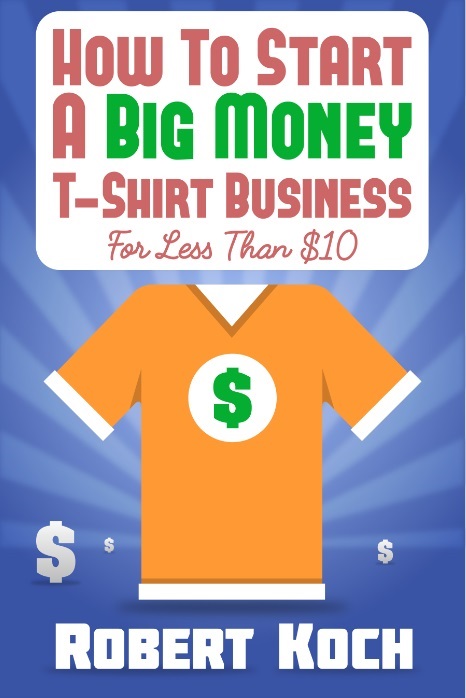 A few months ago I self-published a nonfiction guide titled How To Start A Big Money T-Shirt Business For Less Than $10. Within a few hours of its release my project was in Amazon’s “Top 100 Business Books,” right next to authors like Walter Isaacson and Tim Ferriss.
A few months ago I self-published a nonfiction guide titled How To Start A Big Money T-Shirt Business For Less Than $10. Within a few hours of its release my project was in Amazon’s “Top 100 Business Books,” right next to authors like Walter Isaacson and Tim Ferriss.
Rather than brag or sell you an eBook on writing eBooks, I’m going to give you the full breakdown of how self-publishing works and how you can write your own bestseller. While I’ve already written about the formatting aspects here, the following post covers something that’s just as important: marketing. I’ll also discuss why you should write your own book, even if you aren’t interested in becoming a professional writer.
Anyway, let’s get down to business…
Why You Need Your Own Product (Even If You Have No Intention Of Ever Working For Yourself)
From time to time I get emails from guys who say stuff like “I make $15 an hour as an electrician, your site has no value to me!” That’s fine. It’s a big world and everyone is entitled to doing what they want. However, I do want to point out that writing eBooks (or selling other products) doesn’t have to be a full-time job. You can do these things in your spare time and still make pretty good money.
In fact, I’d actually go as far as to say that people who don’t work for themselves are actually the folks who’d benefit the most from writing eBooks. Sounds nonsensical but allow me to explain:
When you work for someone else you end up paying the government a lot in taxes. And this is especially true if you’re a single man without any kids. When you work for yourself there are all kinds of business expenses that you can use to off-set your taxes. Buy a book? It’s research material. Get a new laptop? That can be marked off too.
You could take a vacation to Hawaii, author your own travel guide, and write-off a portion of your trip.
Simply put, having a little eBook publishing business is a great way to reduce your taxes. When you have a company, even a small one like this, there are a lot opportunities for saving cash.
- “Rainy day” money
Life can be rough. You wreck your car, there are layoffs at work, the water heater goes out at home; there’s always something bad that happens. Many people don’t have the money to cover these situations.
If you have a product, especially one with little to no production cost (like an eBook), you always have a way to make some extra cash. When you have something to sell, and know who will buy it, you have a license to print money. Granted it might not be a lot of money, but it’s better than nothing.
Even an extra $200 – $600 a month, which is very doable, could help keep you afloat. A couple hundred bucks a month might not sound like a whole lot, but it’s a start. In a worst case scenario where you’re laid off and unable to find work, I’ll bet you’d be pretty happy to have even a small stream of income.
Write What You Know
The average nonfiction book sells 250 copies in its entire lifetime. Many people will complain about the market, or keywords, or any number of other minor issues. They’ll tell you that the Amazon algorithm glitched or that their fans are morons, or that people just don’t read any more. But I have a theory of my own. Do you want to know it?
Most Authors Are Liars
When most people get behind a keyboard they turn into Mr. All-Knowing Coolguy. Everything they say is gospel and anything bad that happens to them is completely out of their control. One has to look no further than the average men’s blog to see the truth. Some dingus (who in real life is at the bottom of social totem pole) is genius guru who you’d be a fool to ignore.
As a result the market is saturated with disingenuous books and blogs. Guys who work at a phone kiosk are penning titles like How To Live The Life Of Your Dreams. People, even the dumb ones, are smart enough to see through this ruse. Most folks can tell when they’re getting fed an obvious line of bull. And they’ll go out of their way to avoid buying products from someone they don’t trust.
Ironically, you can make way more money through well-marketed honesty than you can through some crummy scam product. Instead of trying to pretend that you’re some billionaire playboy, be open with your readership. Chances are, you have a personal story that’s far more incredible than any yarn you try to cook up.
Case in point: This blog has a very simple story. It’s about a guy who quit his job and started experimenting with a lot of different ways to make money. That’s not an extraordinary situation but it is one that’s honest.
If you want to know how deep your honesty should go, I’m going to let you in a dirty little secret. The main reason I put out my book was so that I could write this article for you. I wasn’t interested in the money (that’s all going to charity), I just felt that it would be a little weird for me to write an article on publishing bestsellers without having one of my own books to show you.
In order to succeed you have to build trust with your audience. That means being honest. Ditch the bad boy/cool dude persona and find a way to actually relate to others. Tell the people what you did (or are doing), how you accomplished it, and why this information will benefit them.
Marketing Is (Often) More Important Than The Product
Before ever writing a single word, you should know exactly who your book is for and what makes it unique. I run a writing consultation service and am always amazed at the number of clients who have no idea as to what might make their book special. They’ll sit down and write a title without ever thinking about what makes it unique. As a result, they’ll try to pitch their book as “a guide to losing weight” or “money making advice.” This generic marketing causes them to get completely ignored by potential buyers.
Every book needs an edge. Whatever you’re writing about has already been done to death. Fitness and health? There are millions of books on the subject. Writing How To Get Abs isn’t enough to get people buying. Publishing How To Get The Perfect Six-Pack Without Giving Up Beer, Hot Wings, Or Fried Food, that would probably sell pretty well. Both books could have similar content (a list of ab exercises, some dieting tips, and the science behind six-packs) but the packaging is radically different.
If you still don’t believe in the power of good marketing, I have some homework for you. Go on Amazon and look up bestselling diet books. Write a few titles down (I’d recommend at least five) and then take a trip to your local library. Check out all the books you wrote down and then spend some time (maybe an afternoon) flipping through each one. I can almost guarantee you that the content in each one is almost identical (eat more vegetables, cut back on the sweets, go for a walk, etc). The major difference between each product is how it’s marketed.
I’m obviously not advocating that you rehash old or outdated content. But I am telling you that marketing is just as important as the book itself. If you’re writing a great book with high quality information, why not maximize its exposure and make sure that it reaches the people who need it most?
While I could write thousands upon thousands of words about marketing, I’m going consolidate everything I know down to two powerful sentences. Ask yourself these questions before you sit down and start writing your next book, blog post, or newsletter:
“My content appeals to _______.”
“My content is about _______ and does ______ better than all the competitors in this niche.”
If you’re interested in learning more about marking I recommend checking out Dan Kennedy’s No B.S. Direct Marketing (Amazon). I like to consult it every time I start a new project.
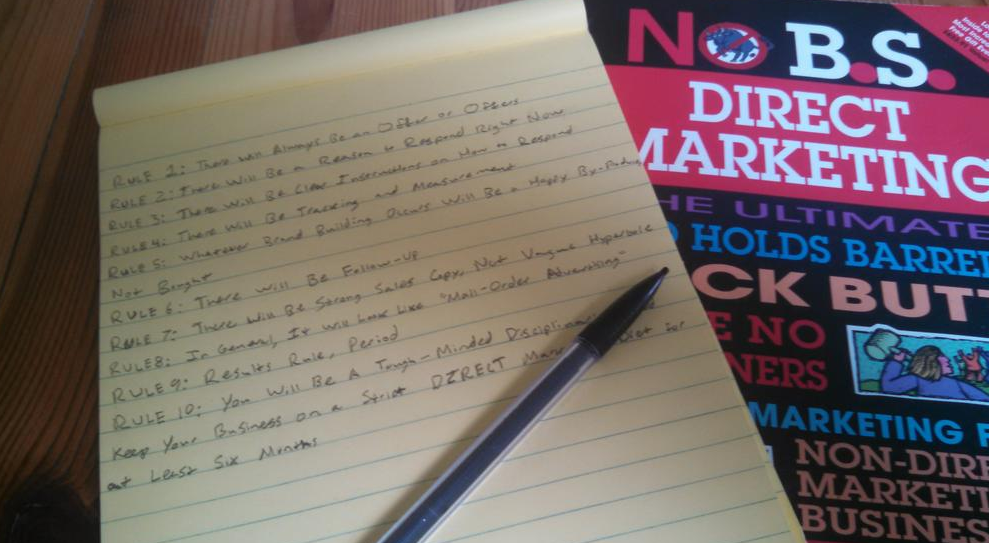
Additionally, I’d highly suggest studying some classic sales letters. A good written advertisement will bring in tens of millions of dollars. You can find some of the most profitable sales letters of all time right here for free. Pick an ad and write it out by hand. Then think about who the sales letter was targeted towards and how it tried to get customers to buy.
As a special bonus, I suggest that you compare this ad with my eBook’s sales pitch. I think you’ll find that they have a few similarities.
Meet The Needs Of Your Audience
I love Lana Del Rey. I’m listening to her music as I type this right now. However, I also know it would be a little weird if you visited this site one day and were accosted by an article about my new eBook, 500 Lana Del Rey Facts You Never Knew. My audience is mostly men and they’re primarily interested in fitness, making money, travel, and things of that nature.
Giving your audience what they want might sound like common sense, but many people ignore this basic tenant.
A few years back I kept up with a travel blog where this guy worked two hours a month (that’s no typo) and visited all kinds of crazy countries. One day, while checking his site, I saw that he was releasing a book. I scrolled through the post, eager to buy his product. But what I saw was disappointing. Instead of offering a book about world travel or adventuring, he’d written an eBook about starting your own rental car company. What he was selling and what his audience wanted did not match up. Even if his product was awesome I’ll never know. It wasn’t something I was interested in so I didn’t buy the book.
Not All Markets Are “Over-Saturated”
A friend of mine writes romance novels. Her audience is primarily middle-aged women who are not super tech savvy. While they know how to use the Internet and whatnot, they would have no idea how to set up a blog or use a service like WordPress.
Silly as it may sound, there are a lot of women who are interested in starting websites about romance novels and erotica stories. After realizing this my friend wrote a short guide to starting your own romance or erotica blog. The book contained very basic information (how to select a hosting service, how to install themes, etc) that “biz-op” bloggers (like Tim Ferriss or Sean Ogle) would have written about in a free post.
Did the women buying the book complain? Of course not! They got reliable information from someone they trusted, and the information specifically focused on their interest. A 30-year-old woman is not going to read an article titled “How To Make Location Independent Passive Income From A Niche Content Blog.” But she will buy a book that teaches her how to start a website where she can review her favorite romance novels. The information in both might be the similar, but each author has marketed themselves towards a completely different demographic.
A lot of people complain that every market is over-saturated. The problem isn’t the market, it’s who you’re marking too.
Year after year aspiring “businessmen” churn out rehashed content for the same tired masses. 10 Best Exercise Routines, Become More Confident, How To Make $100 A Day Online, the list goes on and on. Most of them fail. Unless you have really good marketing skills, some high-level endorsements (why do you think celebrities are paid through the nose to name-drop a product?), and a big budget (many pay-per-click campaigns cost, and rake in, millions), there’s very little chance that you’re going to be selling fluff to the masses. It’s doable, but not something I’d feel comfortable talking about on a free blog like this one.
If you want to start fiddling with product creation and marketing (without paying $1,200 for a subscription to Stack That Money), I’d recommend doing your homework and finding a way to bring quality information to an under-served niche.
Since this post literally contains all the tools you’ll need to create a popular product, I’ll even throw in a little marketplace idea for you. The Beermoney forum on Reddit (link) is filled with all kinds of people looking to make a couple bucks a month off the Internet. There are almost 90,000 potential customers and many of their questions look like this:
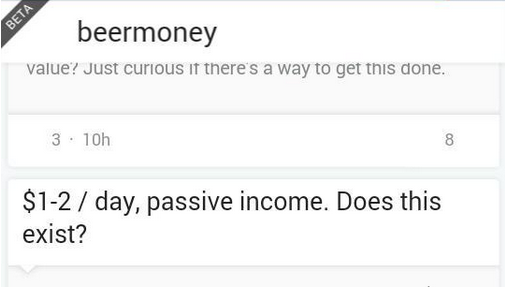
Could you come up with a way to meet their need? I guarantee the answer is yes.
On Twitter I frequently make jokes about the weekly seven dollar checks I get from an old affiliate link.
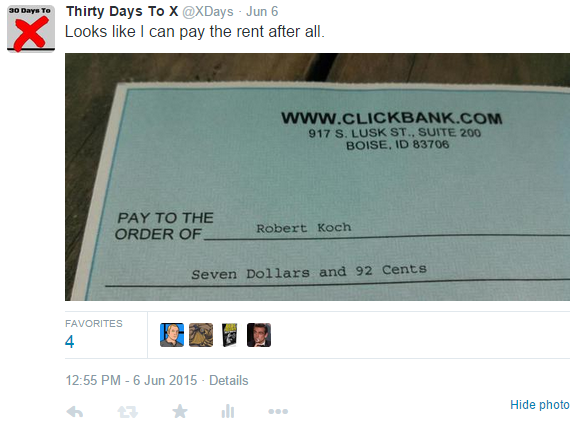
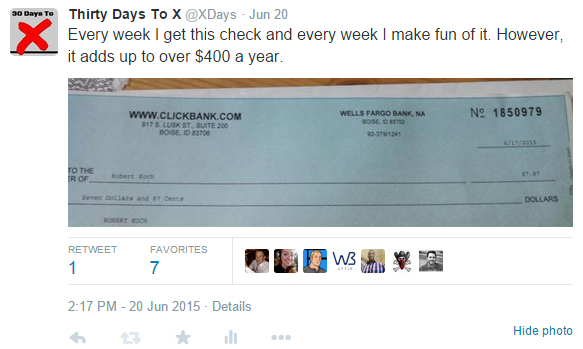
While that’s not a whole ton of money, it is an extra $400 a year. Something that would blow some of these people’s minds (like the guy asking if it’s actually possible to make a dollar a day online). Could you come up with an eBook on starting a website, finding a product to affiliate market, and writing copy that gets readers to buy? I think so, and you’d probably do pretty well too.
Rookie Market Vs. Advanced Content
When you sell something you (generally) have two demographics to choose from. People who have no idea what they’re doing (or who are too lazy to take action), and people who are proficient at something but want a little extra edge.
While there’s nothing wrong with selling to the masses, you’ll get burnt out pretty quickly. A lot of people ask stupid questions and many clients can be difficult to work with (most average people are super cheap and try to waste as much of your time as possible). Because of this (and because I hate responding to emails and generally think all questions are stupid), I have an assistant. If you’re planning on doing a product launch, I’d suggest hiring someone to answer emails. You didn’t start your own business to be a secretary after all.
Advanced content is a little different. These people are generally easier to work with and aren’t going to throw a tantrum about “Internet marketing” or whatever. However, there is a catch. In order to sell to this crowd you have to really know what you’re doing. This means that you must have actual credentials. If you’re good at something, this can be a lucrative route. The clients are not only better, but they aren’t expecting a bunch of free stuff. About a month ago I started a niche website for people with advance level skills in a certain field. One one of the client’s emailed me a question, I respond, and then they asked “How much do I owe you?” That’s not something you’re going to get from the average person.
Quick aside: A great way to tell who a product is for is to look at how it’s marketed. Products that contain valuable information usually rely on empirical data. Items sold to the masses utilize “rube bait,” or claims that sound impressive but ultimately have nothing to do with the product (i.e a picture of the seller’s sports car or house in Jamaica).
Answered At Last: Can You Really Make Lots Of Money Online?
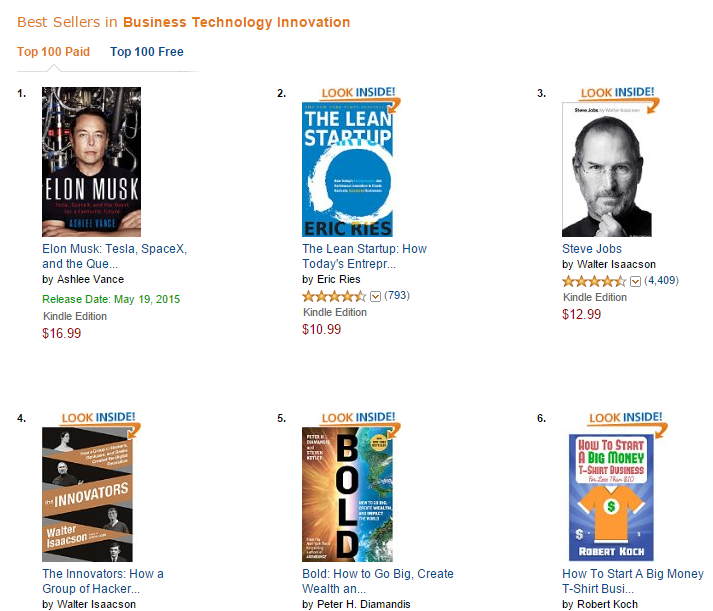
First-off, making money online is no different than making money anywhere else. The Internet does not run on magic and there is no mystical wizard who conjures up E-money. You have to adhere to the same business principles as a regular business.
Here are the actual sales numbers from my book’s first month in circulation:
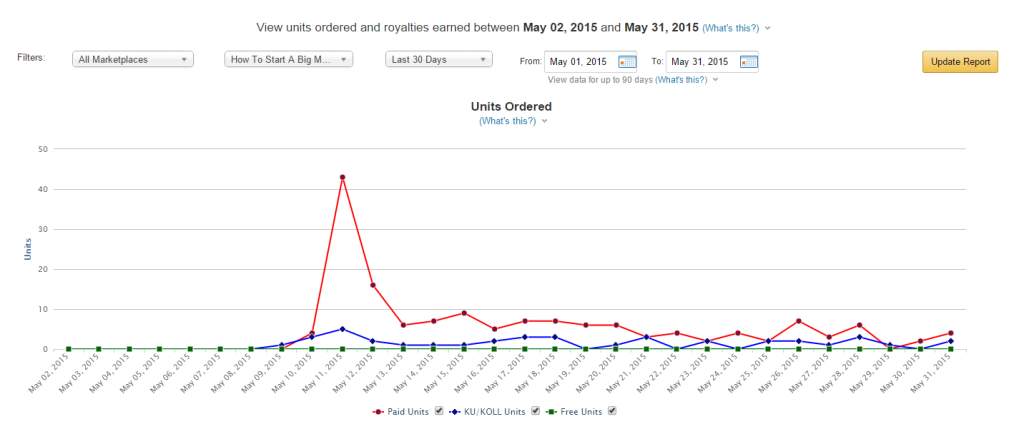
Here are the sales for the current month:
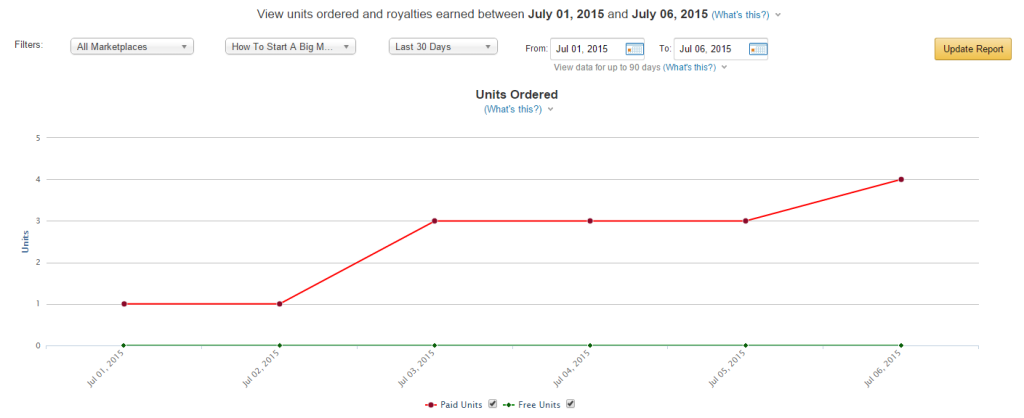
At the current rate I’ll make about $200 per month in passive income from my book. Not great, but it’s something. As an author with over 30 titles on the market, I can basically support myself off royalties alone. Even if I don’t want to work for a day or two I still get paid.
On top of this, it should be realized that I didn’t need to do a whole lot of research to write any of my books. Most are just taken from personal experience where I turned my notes on a topic into a product. Essentially I get paid for retelling something that I’ve done. This means I’m not wracking my brain or spending three years researching a subject, I’m taking something I’m proficient at and writing it out into a coherent guide.
If you have a set of skills, or are good at something, why not turn your knowledge into a book? The self-help industry generates billions of dollars each year, people are thirsty for quality advice. Why not get in on the action?
Special Bonus: How To Come Up A Million-Dollar Idea
There are three big niches that interest most people. These are health, wealth, and dating/socializing. Most how-to books cover at least one of these aspects. However, just below the surface of each topic, is the real draw. Eating granola or making a girl laugh isn’t the driving force. At the end of the day, most people just want positive attention. A fitness book doesn’t sell itself by saying “lower your body fat to increase blood circulation,” it sells itself by telling you that “when you walk down the street everyone will stop and admire your perfect physique.”
If you want to create a product, find something beneficial that can also attract positive attention towards your customer. The benefit you have to offer should be concise enough that it can be included in the title. Here are a few examples:
- How To Talk To Anyone At Any Event
- 107 Ways To Make Money As A Freelance Writer
- How To Make Authentic German Beer That Everyone Will Love
- Where To Find “Cheap” Comic Books That Are Worth Over $100 Each!
Additionally, you should be passionate about whatever you want to write about (side note: unless you’re willing to shuck out at least a thousand dollars, don’t hire a ghostwriter. All the cheap ones are garbage). If you have a hobby, write a book about it (collecting comic books, restoring old furniture, doing magic tricks). Other enthusiasts will buy your work. If you want to write about something more mainstream, say fitness or making money, find a unique angle. Look at what everyone else is publishing and then do the opposite.
Lastly, avoid vanity projects. These are books and essays about your personal opinion. No one else is going to ever care about them. A lot of guys try to make these and they always bomb. Penning My Thoughts On The 2016 Election, by Joe Schmuck, is not a viable business strategy. Neither is writing some Why I Am An Alpha Male or The Autobiography Of A WordPress Blogger. You might think this is obvious advice, but I’ve seen a lot of people try to release these types of “products.” It never goes well.
Closing Thoughts
Writing and selling a book is surprisingly simple. In fact, it’s so easy that almost anyone can do. I’m not a particularly great writer, but I still do pretty well with my self-published books. You could easily do the same. If you’re willing to learn some marketing basics, meet your audience’s needs, and find an interesting way to present your content, you’ll easily be able to make money as a writer.
For those of you who are serious about becoming a paid author, I’d highly encourage you to check out the articles that I’ve linked to throughout this post. Some of them contain millions of dollars worth of advice. I’d also recommend that you check out my book How To Start A Big Money T-Shirt Business For Less Than $10 (Amazon). Even if you have no interest in making shirts, you can get a good idea as to how easy it is to create a popular eBook.
P.S. For those of you wondering, I’ve gotten several positive testimonials from people who followed the advice from How To Start A Big Money T-Shirt Business For Less Than $10. One guy even traded his $5 T-shirt design for a month of free drinks at his favorite bar!